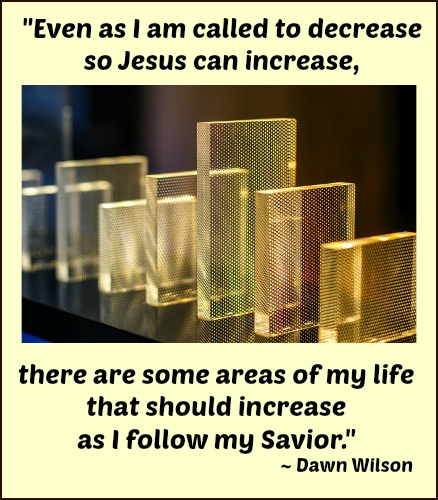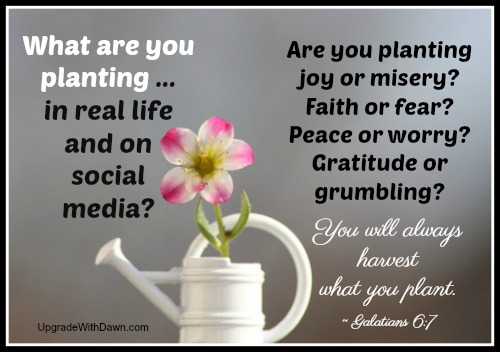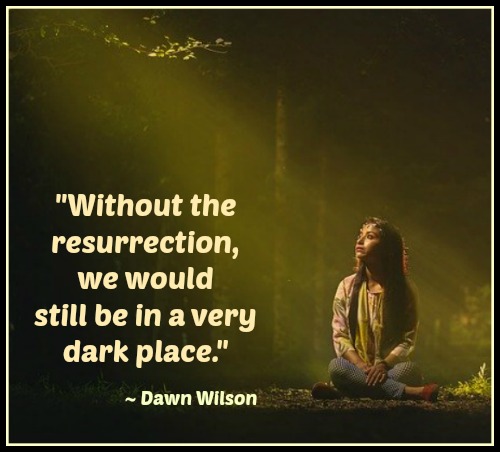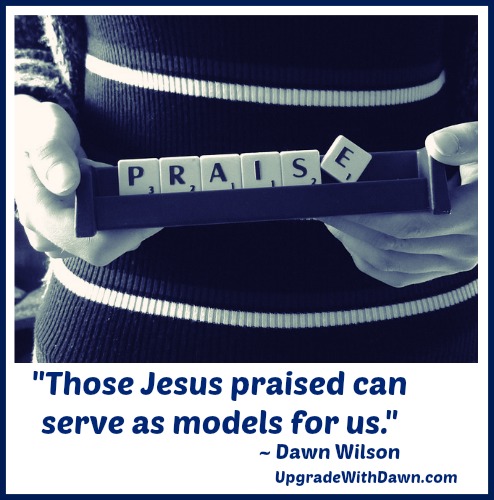As I (Dawn) thought back over the incredible blessings of 2019—blessings and gifts that God has showered into my life in spite of my Multiple Myeloma diagnosis last January—one word keeps coming to mind: "Increase."

In this Spiritual Growth UPGRADE, I want to focus on God's great gift to us, and how we might respond to that gift in the year to come. Then I want us to consider how the concept of "decrease / increase" might be a life changer for us.
I. God Gave an Incredible Blessing
Ephesians 1:3 says, "Praise be to the God and Father of our Lord Jesus Christ, who has blessed us in the heavenly realms with every spiritual blessing in Christ."
Everything changed with the pronouncement of that blessing—"in Christ."
The scripture that repeatedly came to mind this past Christmas was 1 John 4:14—"The Father sent the Son to be the Savior of the world."
What amazing love. What tender mercies. What a blessing!
How blessed we are! Jesus came from Heaven (Philippians 2:7-8a) and made a way—the only way (John 14:6; Acts 4:12; Philippians 2:8b)—for us to live with Him, our exalted King, in heaven (Philippians 9-10).
God intends to bless us forever in Jesus.
God always intended to bless His creation. He told Abraham, "... blessing I will bless you" (Genesis 22:17a). From Adam and down through the Patriarchs, God explained how much He wanted to bless His people, to multipy their numbers on the earth.
But they were still sinners. They still needed a Savior. They looked forward to the day God would send the promised One (Genesis 3:15). Today, we look back to that day. The day the Father sent the Son.
II. God's Blessing Invites a Response
We ignore this great blessing to our peril.
The blessing of God at Christmas invites a heart response. That's why pastors give invitations.
Some of the saddest verses in scripture are John 1:10-11. "He (Jesus) was in the world, and the world was made through him, yet the world did not know him. He came to his own, and his own people did not receive him."
Jesus came to be the Savior, but He was not received. In fact, He was rejected (Luke 4:14-30; Acts 4:11).
But one of the happiest verses in scripture is John 1:12: "But to all who did receive him, who believed in his name, he gave the right to become children of God."
This is the response to the blessing that God desires. The Father sent the Son to be the Savior ... and He wants us to receive and believe.
III. My Unexpected "Blessing"
Sometimes our blessings aren't immediately recognized as blessings. This was the case with my Multiple Myeloma diagnosis.
God intends to use it for great blessing. That is why I have often called my diagnosis a "gift."
The Lord has already used my disease to open my eyes to many things:
- My laziness and short-sightedness regarding Kingdom priorities.
- Materialism that distracted me from true riches in Christ.
- Selfishness with my time and talents.
- Pride regarding my accomplishments.
- An earthly focus rather than living with eternity in view.
And so much more!
So as I have thought about the great blessings in my life in 2019—even those who come in "ugly wrappings"—I am more determined than ever to seek the Lord and His will in 2020.
Here are some things the Lord is saying to me . . .
IV. He—Jesus—Must "Increase"
We focus on Baby Jesus at Christmas—but must remember that in time, Baby Jesus grew up. The Bible says He "increased in wisdom and in stature and in favor with God and man" (Luke 2:52).
Incidentally, that is how the Father wants us to increase. And we will, if we become Christ-like.
When Jesus was ready to begin His public ministry, the disciples of John the Baptist saw that many of John's followers were splitting off to follow after Jesus. They questioned this sudden change. John reminded them that he was not the Christ, but had only been "sent before Him" to prepare the way.
It was natural that the public ministry of Jesus would take off as John's preparatory ministry would begin to shut down.
John told his disciples, "He must increase, but I must decrease" (John 3:30). Then John began to point them and others to the Lord's expanding ministry.
During 2019, the Lord urged me many times to consider my future, for as long as He allows me to live. It's not to be about platform building or making my name known (not that there's anything wrong with that if God calls you to it).
The Lord clearly said to me, "You don't know how many years I'll give you, but I want you to give those years to Me.
"I want you to magnify Me and make My name known."
He has already blessed me mightily. He has redeemed me. He has shown Himself merciful and faithful, powerful and good.
And my response?
He must increase—I must decrease.
This is a matter of attitude and position.
In a culture that pushes pride and self-promotion, "decreasing" in order to highlight Jesus' magnificence to others is no simple assignment. But that is the path of humility. That is the path Jesus walked.
"Let this mind be in you, which was also in Christ Jesus...." (Philippians 2:5).
It's taking on the form of a servant. Just as Jesus came not to be served but to serve (Mark 10:45), that is the lifestyle He calls His followers to as well.
V. Yet ... I'm Blessed to "Increase" Too!
Even as I am called to DECREASE so Jesus can increase, there are some areas of my life that should INCREASE as I follow my Savior.
1. My Surrender Should Increase
"... present your bodies a living and holy sacrifice, acceptable to God, which is your spiritual service of worship" (Romans 12:1).
"I have been crucified with Christ; and it is no longer I who live but Christ lives in me; and the life which I now live in the flesh I live by faith in the Son of God, who loved me and gave Himself up for me" (Galatians 2:20).
"For whoever wishes to save his life will lose it, but whoever loses his life for My sake and the gospel's will save it" (Mark 8:35).
2. My Love Should Increase
"Love the Lord your God with all your heart and with all your soul and with all your mind and with all your strength" (Mark 12:30).
"Dear friends, since God so loved us, we also ought to love one another" (1 John 4:11).
"Be devoted to one another in love. Honor one another above yourselves" (Romans 12:10).
"And this I pray, that your love may abound still more and more...." (Philippians 1:9a).
"But I tell you, love your enemies and pray for those who persecute you" (Matthew 5:44).
3. My Praise Should Increase
"Let us praise God for His glorious grace, for the free gift He gave us in His dear Son" (Ephesians 1:6).
"Praise Him—He is your God, and you have seen with your own eyes the great and astounding things that He has done for you" (Deuteronomy 10:21).
"We proclaim how great you are and tell of the wonderful things you have done" (Psalm 75:1).
4. My Ministry Should Increase
"And God is able to make all grace abound to you, so that always having all sufficiency in everything, you may have an abundance for every good deed" (2 Corinthians 9:8).
"For the ministry of this service is not only supplying the needs of the saints, but is also overflowing in many expressions of thanksgiving to God" (2 Corinthians 9:12).
"Therefore, my beloved brethren, be steadfast, immovable, always abounding in the work of the Lord, knowing that your toil is not in vain in the Lord" (1 Corinthians 15:58).
5. My Giving Should Increase
"You will be enriched in every way to be generous on every occasion, and your giving through us will produce thanksgiving to God" (2 Corinthians 9:11).
"Each of you should give what you have decided in your heart to give, not reluctantly or under compulsion, for God loves a cheerful giver" (2 Corinthians 9:7).
"Do not withhold good from those to whom it is due, when it is in your power to act" (Proverbs 3:27).
You can perhaps think of other areas that should INCREASE AS YOU DECREASE (in humility), and follow hard after the Lord.
Do you know how much you've been blessed? What is your response to that blessing? Could there be some fresh area of "increase" that would honor the Lord this Christmas and in 2020?
Dawn Wilson, founder and President of Heart Choices Today, is a speaker and author,  and the creator the blog, Upgrade with Dawn. She is a contracted researcher/reviewer for women's teacher and revivalist, Nancy DeMoss Wolgemuth, at Revive Our Hearts, a blogger at TrueWoman.com, writes wiki-type posts at Christianity.com, and is a regular columnist at Crosswalk.com. She and her husband Bob live in sunny Southern California, and Dawn has traveled with Him in Pacesetter Global Outreach. They have two grown, married sons, three granddaughters and a rascally maltipoo, Roscoe.
and the creator the blog, Upgrade with Dawn. She is a contracted researcher/reviewer for women's teacher and revivalist, Nancy DeMoss Wolgemuth, at Revive Our Hearts, a blogger at TrueWoman.com, writes wiki-type posts at Christianity.com, and is a regular columnist at Crosswalk.com. She and her husband Bob live in sunny Southern California, and Dawn has traveled with Him in Pacesetter Global Outreach. They have two grown, married sons, three granddaughters and a rascally maltipoo, Roscoe.
Graphic adapted, courtesy of Analogicus at Pixabay.
 I have heard the scripture, Galatians 6:7-8 for years. I know it refers to being careful not to "sow" to our sinful flesh (which is destructive), but to instead plant to please the Holy Spirit, because from the Spirit we will reap eternal life and spiritual growth.
I have heard the scripture, Galatians 6:7-8 for years. I know it refers to being careful not to "sow" to our sinful flesh (which is destructive), but to instead plant to please the Holy Spirit, because from the Spirit we will reap eternal life and spiritual growth. and the creator the blog, Upgrade with Dawn. She is a contracted researcher/reviewer for women's teacher and revivalist, Nancy DeMoss Wolgemuth, at Revive Our Hearts, a blogger at TrueWoman.com, writes wiki-type posts at Christianity.com, and is a regular columnist at Crosswalk.com. She and her husband Bob live in sunny Southern California, and Dawn has traveled with Him in Pacesetter Global Outreach. They have two grown, married sons, three granddaughters and a rascally maltipoo, Roscoe.
and the creator the blog, Upgrade with Dawn. She is a contracted researcher/reviewer for women's teacher and revivalist, Nancy DeMoss Wolgemuth, at Revive Our Hearts, a blogger at TrueWoman.com, writes wiki-type posts at Christianity.com, and is a regular columnist at Crosswalk.com. She and her husband Bob live in sunny Southern California, and Dawn has traveled with Him in Pacesetter Global Outreach. They have two grown, married sons, three granddaughters and a rascally maltipoo, Roscoe. 1 Comment → Posted on
1 Comment → Posted on  Tuesday, August 18, 2020 at 9:39AM
Tuesday, August 18, 2020 at 9:39AM 







